#dwell time
Explore tagged Tumblr posts
Text

Dwell Time: SEO ve Kullanıcı Deneyiminde Kritik Bir Metrik
Dwell Time, bir kullanıcının arama motoru sonuçları üzerinden tıkladığı bir web sayfasında geçirdiği süreyi ifade eder. Basitçe açıklamak gerekirse, kullanıcı bir bağlantıya tıkladığında sayfada ne kadar vakit geçiriyor ve ardından arama sonuçlarına geri dönüyor? İşte bu süre, Dwell Time olarak adlandırılır.
Kullanıcı Deneyimi ve Dwell Time İlişkisi
Kullanıcı deneyimi, Dwell Time’ı etkileyen en önemli faktörlerden biridir. Bir ziyaretçi, sayfanızda ilgi çekici ve değerli içerik bulduğunda sayfada daha uzun süre vakit geçirir. Ancak, içerik alakasız ya da karmaşık olduğunda kullanıcı hızla sayfayı terk eder. Bu durum, kullanıcı deneyiminin Dwell Time üzerinde nasıl doğrudan bir etkisi olduğunu gösterir.
SEO Açısından Dwell Time’ın Önemi
Arama motorları, özellikle Google, kullanıcı davranışlarını izleyerek içeriklerin kalitesini anlamaya çalışır. Dwell Time, Google’ın bir sayfanın kullanıcıların ihtiyaçlarını ne kadar iyi karşıladığını ölçmek için dikkate aldığı metriklerden biridir. Kullanıcıların bir sayfada uzun süre kalması, arama motorlarına bu içeriğin alakalı ve faydalı olduğunu gösterir.
Dwell Time Nasıl Ölçülür?
Sayfada Kalma Süresi ile Karıştırılmamalıdır
Dwell Time, sıkça sayfada kalma süresi (time on page) ile karıştırılır. Ancak ikisi farklıdır. Sayfada kalma süresi, genel olarak bir kullanıcının bir web sayfasında ne kadar vakit geçirdiğini ölçerken, Dwell Time yalnızca arama motoru sonuçları üzerinden gelen trafik için geçerlidir.
Dwell Time ile Bounce Rate Farkı
Bounce Rate (hemen çıkma oranı) ise, bir ziyaretçinin yalnızca bir sayfayı ziyaret ettikten sonra siteyi terk etme oranını ifade eder. Dwell Time, kullanıcının sayfada geçirdiği süreye odaklanırken, Bounce Rate tamamen etkileşim eksikliğine odaklanır.
Dwell Time’ı Etkileyen Faktörler
İçerik Kalitesi ve Okuyucuyu Etkileme
İçerik kalitesi, Dwell Time üzerinde en büyük etkiye sahiptir. Kullanıcılar, faydalı ve bilgilendirici içerikler bulduğunda sayfada daha uzun süre vakit geçirir. Özgün, detaylı ve okuyucunun ilgisini çeken içerikler oluşturmak bu nedenle kritik öneme sahiptir. Soru-cevap formatları, infografikler ve gerçek hayat örnekleri kullanılarak içeriğin daha cazip hale getirilmesi mümkündür.
Web Sitesi Tasarımı ve Hız Faktörü
Kullanıcıların sayfanızda kalmasını istiyorsanız, web sitenizin tasarımı basit, hızlı ve kullanıcı dostu olmalıdır. Yavaş yüklenen bir web sitesi, kullanıcıların hızla başka bir seçeneğe yönelmesine neden olabilir. Google PageSpeed Insights gibi araçlar yardımıyla web sitenizin hızını optimize edebilirsiniz.
Başlık ve Meta Açıklamanın Rolü
Kullanıcıların bir bağlantıya tıklamadan önce gördüğü ilk şey başlık ve meta açıklamadır. Bu nedenle, başlıklarınızın ilgi çekici ve merak uyandırıcı olması önemlidir. Kullanıcılar, vaat edilen bilgiyi gerçekten bulursa sayfada daha uzun süre kalır.
Dwell Time’ın SEO Üzerindeki Etkileri
Arama Motoru Sıralamalarında Dwell Time’ın Yeri
Google, sıralama algoritmasında Dwell Time gibi kullanıcı davranışlarına dair verileri dikkate alır. Kullanıcıların bir sayfada uzun süre kalması, o sayfanın arama sonuçları için değerli bir kaynak olduğunu gösterebilir. Bu nedenle Dwell Time, dolaylı yoldan SEO stratejilerinizin başarısını etkileyen önemli bir faktördür.
Google’ın Dwell Time’a Bakışı
Google, resmi olarak Dwell Time’ı bir sıralama faktörü olarak açıklamamış olsa da, kullanıcı davranışlarını anlamak için bu tür metriklerden faydalandığı bilinmektedir. Özellikle, kullanıcıların kısa süre içerisinde sayfadan ayrılması, içeriğin alakasız ya da yetersiz olduğunu düşündürebilir.
Dwell Time Nasıl Artırılır?
Kullanıcı Odaklı İçerik Oluşturma
İçeriğinizi kullanıcıların sorularını yanıtlayacak şekilde tasarlayın. Kullanıcıların gerçek ihtiyaçlarını ve ilgilerini anlamak, Dwell Time’ı artırmak için kritik bir adımdır. Örneğin, popüler sorulara detaylı cevaplar sunan rehber içerikler oluşturabilirsiniz.
Multimedya İçeriklerin Kullanımı
Videolar, görseller ve infografikler gibi multimedya içerikler, kullanıcıların sayfada daha uzun süre kalmasını sağlar. Bu tür içerikler, okuyucuların ilgisini çekmekle kalmaz, aynı zamanda metni destekleyerek bilgilerin daha kolay anlaşılmasını sağlar.
İç Bağlantılar ve Sayfa Akışı
Sayfanızda anlamlı ve ilgili iç bağlantılar kullanarak kullanıcıları diğer sayfalara yönlendirin. Örneğin, bir makale içinde “Daha fazla bilgi için şu makaleye göz atabilirsiniz” gibi yönlendirmelerle okuyucunun site genelindeki deneyimini zenginleştirebilirsiniz.
İdeal Dwell Time Süresi Nedir?
Farklı Sektörlere Göre Dwell Time Kriterleri
Her sektör için ideal Dwell Time farklılık gösterebilir. Örneğin, bir teknik makale veya rehber içeriği için kullanıcıların birkaç dakika geçirmesi ideal kabul edilirken, bir ürün sayfasında bu süre daha kısa olabilir.
Kısa mı Uzun mu? Hangisi Daha İyi?
Dwell Time ne kadar uzun olursa, genellikle o kadar iyi olarak kabul edilir. Ancak bu, kullanıcı deneyimi ile de dengelenmelidir. Kullanıcılar, ihtiyaç duydukları bilgiyi hızlıca bulabiliyorsa, kısa bir Dwell Time da olumlu bir işaret olabilir.
Dwell Time Optimizasyonu için İpuçları
Hızlı Yüklenen Web Siteleri
Yavaş yüklenen bir web sitesi, Dwell Time’ı olumsuz etkiler. Kullanıcılar, bir sayfanın yüklenmesini beklerken sabırsızlanır ve genellikle geri düğmesine basarak başka bir seçeneği tercih eder. Bu durumu önlemek için web sitenizi optimize edin. Görselleri sıkıştırmak, gereksiz kodları kaldırmak ve bir içerik dağıtım ağı (CDN) kullanmak hız optimizasyonu için etkili yöntemlerdir.
Mobil Uyum ve Kullanıcı Dostu Tasarım
Mobil cihazlardan gelen trafik günümüzde masaüstü trafiği geçmiş durumda. Bu nedenle, sitenizin mobil cihazlarla uyumlu olması şarttır. Duyarlı bir tasarım, ziyaretçilerin siteyi rahatça gezmesine olanak tanır ve sayfada daha uzun süre kalmalarını sağlar.
Anlamlı ve İlgi Çekici Başlıklar
Başlıklarınız, kullanıcıların dikkatini çekmeli ve onları tıklamaya teşvik etmelidir. İlgi çekici başlıklar kullanarak ziyaretçilerin beklentilerini karşılayın. Örneğin, “Dwell Time Nedir ve Nasıl Artırılır?” gibi net ve bilgilendirici bir başlık, kullanıcıların merakını uyandırabilir.
SEO Stratejisinde Dwell Time’ı Ölçmenin Önemi
Google Analytics ile Takip
Dwell Time’ı anlamanın en iyi yollarından biri, Google Analytics gibi araçları kullanmaktır. Bu araçlarla kullanıcıların bir sayfada ne kadar süre geçirdiğini ve hangi sayfaların daha fazla etkileşim aldığını izleyebilirsiniz.
Hangi Metrikler Dwell Time’ı İyileştirir?
Ortalama Oturum Süresi: Kullanıcıların site genelinde geçirdiği toplam süre.
Sayfa Görüntüleme Sayısı: Kullanıcıların kaç farklı sayfayı ziyaret ettiği.
Hemen Çıkma Oranı: Daha düşük hemen çıkma oranı, genellikle daha iyi Dwell Time anlamına gelir.
Sosyal Medya ve Dwell Time İlişkisi
Sosyal Medyadan Gelen Trafik ve Dwell Time
Sosyal medya, web sitenize trafik çekmenin etkili yollarından biridir. Ancak bu trafiğin Dwell Time’a katkı sağlaması için, sosyal medya paylaşımlarınızın doğru kullanıcıları hedeflemesi gerekir. İlgi çekici bir sosyal medya gönderisi, kullanıcıların sayfada daha uzun süre kalmasına yardımcı olabilir.
Paylaşılan İçeriklerin Kalitesi
Sosyal medya platformlarında paylaşılan içeriklerin kalitesi, Dwell Time üzerinde doğrudan etkilidir. Görsel açıdan zengin, bilgi dolu ve okuyucuyu harekete geçiren içerikler, daha fazla dikkat çeker ve sayfada geçirilen süreyi artırır.
Dwell Time ile CTR (Tıklama Oranı) Arasındaki Bağlantı
İlk İzlenim ve Kullanıcı Davranışları
Dwell Time ile CTR arasında sıkı bir ilişki vardır. Yüksek bir CTR, genellikle kullanıcıların sayfada daha fazla zaman geçirmesiyle sonuçlanır. Ancak kullanıcıların ilgisini sürdürebilmek için içeriklerinizin başlıklar ve meta açıklamalarla uyumlu olması önemlidir.
Başlıklar ve Görsellerin Etkisi
Başlıklarınız, yalnızca tıklamaları teşvik etmekle kalmamalı, aynı zamanda içeriğinizi özetleyerek kullanıcıları sayfada tutmalıdır. Görsellerin kullanımı da burada büyük bir rol oynar. İlgi çekici görseller ve infografikler, ziyaretçilerin daha fazla zaman geçirmesine yardımcı olur.
Video İçeriklerin Dwell Time’a Katkısı
Etkileşim Süresi ve Video Stratejileri
Video içerikler, kullanıcıların sayfada geçirdiği süreyi artırmak için mükemmel bir araçtır. Kullanıcılar, metin okumaktan daha çok video izlemeye eğilimlidir. Bu nedenle, video içeriklerinizi bilgilendirici ve eğlenceli hale getirerek Dwell Time’ı artırabilirsiniz.
Video ve Blog İçeriği Entegrasyonu
Video içerikleri, blog yazılarıyla entegre etmek, kullanıcı deneyimini güçlendirebilir. Örneğin, bir blog yazısının özetini videoyla sunabilir ya da daha fazla bilgi için yazıya yönlendirebilirsiniz. Bu sayede kullanıcıların ilgisini çekmek ve sayfada kalma sürelerini artırmak kolaylaşır.
Sonuç:
Dwell Time, SEO stratejilerinde sıklıkla gözden kaçan ancak son derece önemli bir metrik olarak karşımıza çıkar. Kullanıcıların bir sayfada geçirdiği süre, içerik kalitesinin ve kullanıcı deneyiminin güçlü bir göstergesidir. Hızlı yüklenen, kullanıcı dostu ve ilgi çekici içeriklere sahip bir web sitesi, Dwell Time’ı artırarak hem SEO sıralamalarınızı hem de kullanıcı memnuniyetinizi üst seviyelere taşıyabilir.
Sıkça Sorulan Sorular (SSS)
Dwell Time tam olarak nedir? Dwell Time, bir kullanıcının arama motoru sonuçları üzerinden bir web sayfasına tıkladığında sayfada geçirdiği süreyi ifade eder.
Dwell Time neden önemlidir? Dwell Time, kullanıcı deneyiminin ve içerik kalitesinin bir göstergesidir. Arama motorları, bu metriği bir sayfanın değerini anlamak için dolaylı olarak kullanabilir.
Kısa Dwell Time, SEO’ya zarar verir mi? Kısa Dwell Time, içeriğin alakasız ya da yetersiz olduğu izlenimini verebilir. Bu da SEO performansınızı olumsuz etkileyebilir.
Dwell Time nasıl artırılabilir? Kullanıcı dostu bir tasarım, kaliteli içerik ve hızlı yükleme süreleriyle Dwell Time artırılabilir.
Dwell Time ile sayfa görüntüleme süresi aynı şey midir? Hayır, Dwell Time yalnızca arama motoru sonuçlarından gelen kullanıcılar için geçerli bir metriktir.
Google, Dwell Time’ı doğrudan sıralama faktörü olarak mı kullanıyor? Google, resmi olarak Dwell Time’ı bir sıralama faktörü olarak belirtmemiştir, ancak kullanıcı davranışlarını anlamak için bu metriği dolaylı olarak kullanabilir.
Mobil cihazlarda Dwell Time ölçümü nasıl yapılır? Google Analytics gibi araçlar, mobil cihazlardan gelen trafiğin Dwell Time verilerini takip etmenize olanak tanır.
İçerik türleri Dwell Time’ı nasıl etkiler? Videolar, görseller ve uzun formatlı içerikler genellikle daha yüksek Dwell Time sağlar.
Dwell Time hangi araçlarla ölçülür? Google Analytics, Dwell Time’ı izlemek için en yaygın kullanılan araçlardan biridir.
Dwell Time düşükse ne yapılmalıdır? Hızlı yüklenen bir site, kullanıcı dostu bir tasarım ve etkileyici içerikler oluşturarak Dwell Time’ı artırabilirsiniz.
0 notes
Text
Why procurement may be the biggest gateway to an enterprise cyber breach
Here are excerpts from an April 2010 article in which I interviewed one of the industry’s top cybersecurity experts, Richard Stiennon – How Vulnerable Are We To A Cyberattack? – https://bit.ly/3TlEVkr ✳ Based on the above conclusions, Stiennon suggests that the best way to deal with the threat of a cyberattack is using economic levers as the primary deterrent mechanism “by increasing the costs…

View On WordPress
0 notes
Text
" be still, my foolish heart, don't ruin this on me "

#good omens#gomens#good omens fanart#gomens fanart#aziraphale#crowley#go aziraphale#go crowley#ineffable husbands#ineffable husbands fanart#time to dwell in the cave for another 10 years or something
807 notes
·
View notes
Text
hc fyodor killing ppl by touch isnt his ability its actually just bc hes so old hes infected w every possible disease but just isnt symptomatic. so when u touch him u immediately contract every plague of the last thousand years and simply perish
#thats why hes not bothered abt putting on his briefly dumpster-dwelling ushanka. like what disease is he gonna get from a city dumpster#that he hasnt already got from living in times of not washing hands#bsd fyodor#bungou stray dogs#bsd chapter 113
1K notes
·
View notes
Text
Viktor's (subverted) Aristotelian Tragedy
A common sentiment I’m seeing throughout post-finale Viktor discourse is an understandable concern or distaste for the element of choice lost throughout his story. I know a lot of us – myself included – expected more time spent on his transformation, along with emphasis on the anger/rage/betrayal fueling it. But seeing him allow Singed to “begin the process” in episode 8 reminded me of Arcane’s origins – tragedy. Bear with me for another long analysis :)

Aristotle wrote the following on the tragedy: “A tragedy is the imitation of an action that is serious and also, as having magnitude, complete in itself…with incidents arousing pity and fear, wherewith to accomplish a catharsis of these emotions.” He also emphasized that the true tragic hero couldn’t be perfect, and his downfall into such catharsis-inducing circumstances was reliant on a fatal flaw, oftentimes pride.
Viktor fits this mold, as do many Arcane characters, and it stands to reason that this was intentional since the writing team has reiterated that the show is a tragedy, at its core.
Regarding Viktor’s fatal flaw, I’d argue it’s pride, but it manifests very uniquely. He never makes any grand declarations about his success and doesn’t draw attention to himself in any clear way throughout season one (“Progress Day” comes to mind). Instead, his pride manifests as staunch independence and self-reliance that lead to his downfall; his unwillingness to break his stoic mold arguably led to his use of the Hexcore…so it goes.

Fascinating caveat: Viktor’s pride is a defense mechanism, a necessary tool he built in order to survive and succeed in a hostile environment to people of his station. His self-reliance is increasingly desperate as his illness worsens. He’s cornered by fate but banks on the sanctity of choice at every turn – in season one, Viktor is bound by the conviction that we all have a choice. It’s why he’s so distressed when Jayce makes the wrong one regarding weaponizing Hextech.
“There is always a choice.”
Viktor’s choice to fuse with the Hexcore is the classic Aristotelian fatal flaw moment, the singular incident that opens the flood gates for eventual catharsis. We watch Viktor make an irreparable choice, one that we know to be bad, and endure the repercussions. He then makes the choice to abandon the Hexcore, and end his life, but audiences can’t shake the feeling that those consequences aren’t leaving anytime soon.
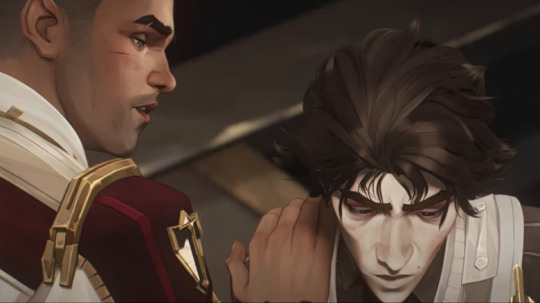
So why is Viktor so anti-choice in his final season 2, act 3 form?
Choice is Viktor’s weapon. Pride is what leads him to abusing it. Despite how uncomfortable and depressing it is to watch, Viktor’s slow descent into the Herald is a perfect twist of fate. The Arcane is even so insidious that it meshes with his original intent, to help those suffering in the undercity, while convincing him that their subservience is healing. He becomes responsible for their choices. He knows what’s best because he’s relieving the Gloriously Evolved of their suffering, right? The utopia is for the greater good, yes?

Admittedly, it was really hard watching act 3 Viktor descend fully into his choiceless ethos. But we can still relate it to his tragic flaw – his pride has mushroomed into coldhearted omniscience; not only does he know what’s best for everyone, evolution, but he also has the sense to make the choice for them to supersede their “baser instincts.” The grief we feel upon seeing this perverted, violent version of himself, as far removed from Viktor as possible, is the culmination of Aristotle’s treatise on tragedy. The catharsis is the rock-bottom Machine Herald.
"Choice is false."

But then Arcane decided to basically make Jayvik canon (get out of here, Christian Linke) and destroyed the early drafts of this post. I’m going to rapid-fire this next bit:
Jayce forces Viktor back to life. Viktor has no agency in his season 2 inciting incident. Again, it’s distressing when we mourn his agency, but it remains in accordance with Aristotelian tragedy.

Viktor clings to humanity as long as he possibly can. When Jayce calls out Viktor’s trajectory, alleging that his old partner had died in the Council chamber, whatever is left of Viktor gives way to the Arcane because his last tether has been snapped.
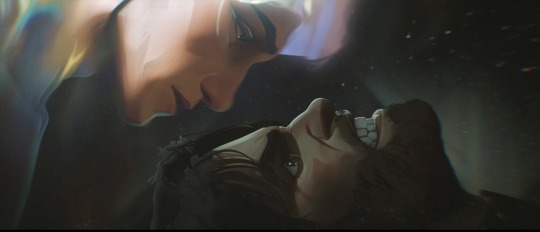
Jayce knows the game – Old Man Jenkins Mage Viktor told him so. Jayce becomes the linchpin in subverting Viktor’s tragedy. He knows what must happen. He understands now.
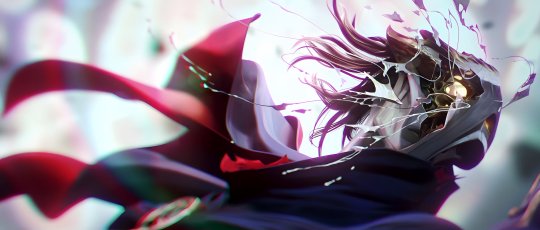
Machine Herald Viktor is given the chance to undo his fatal flaw, to reverse the catharsis, when he sees Old Man Jenkins Mage Viktor. With Jayce’s help, he takes it.
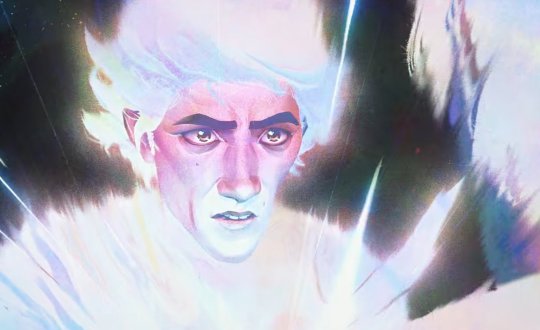
Given that it’s a version of Viktor who ultimately frees him from himself by empowering Jayce, we can gather that Viktor has liberated himself from his tragedy.
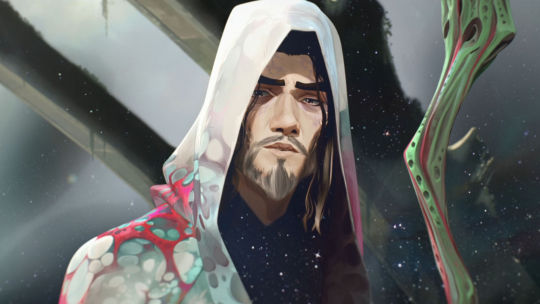
Aristotle’s catharsis is rapidly transformed from something based in release to something healing – Viktor’s tether to humanity returns. He grasps it. The walls of his pride and self-reliance collapse. He accepts Jayce’s help, finally being seen as the full individual he is. Catharsis ensues, for sure, but I don’t think it’s based in the typical tragedy genre.
All this to say, I think Viktor’s arc was, in fact, carefully constructed. He represents the Aristotelian descent into a fatal flaw and that’s very distressing to see unfold, especially since he embodied the tragic hero archetype so well from day one. However, Jayce undoes this narrative and we’re given an incredibly subversive ending that I, personally, never saw coming.
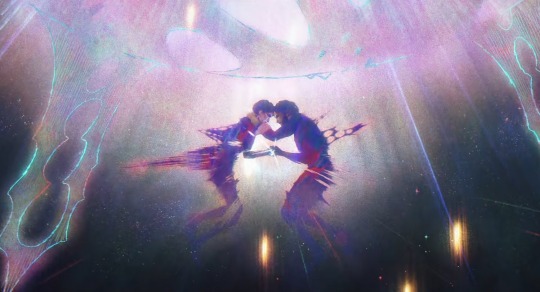
I’m sure that Mage Viktor has a much larger bearing on this analysis than I’m accounting for. But for now, suffice to say that he is Viktor’s way out of the tragedy. TALK ABOUT CHOICE!
This doesn’t erase anyone’s discomfort for Viktor having less and less agency, but I’d like to emphasize the logic and literary precedent behind the story decisions.
PS: here's a quick source I looked at about Aristotelian tragedies. I hope to re-up on Greek tragedies so I can get more specific about the parallels Arcane draws from them.
#wow! big one! thanks for reading if you stuck thru to the end#if you couldn't tell...i am a fan of viktor's entire story#it still doesn't feel fully real to me#and OFC they could have - and should have - spent way more time showing rather than telling#but that's a problem unfortunately endemic to the entire season so i see no point in dwelling too much#i just. i love him#and i will never stop talking about him for as long as i live ok ok#viktor arcane#arcane viktor#jayce talis#jayvik#arcane meta#arcane#arcane season 2#arcane s2#arcane spoilers#also i fucking love old man jenkins mage viktor and nobody will silence me on that front#viktor propaganda
417 notes
·
View notes
Text



If you think there's context for this you're wrong
#gempearl#tubby art#trafficshipping#yeah I dont really know#I just like sad little Pearl who doesnt know what to do with herself being comforted#idk some kinda context where they cant stop to dwell on things at this time but Gem will do what she can
540 notes
·
View notes
Text
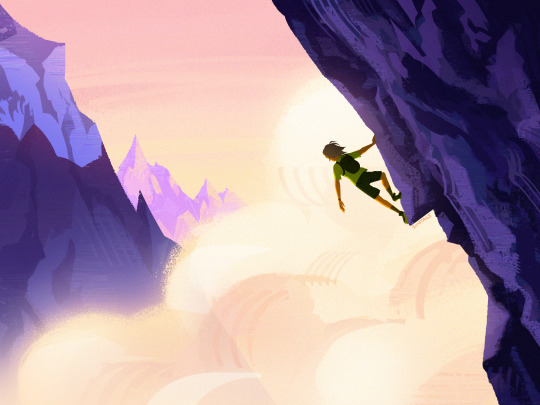
training
#i just wanted to draw him climbing a cliff#thats it thats the post. sebek was originally also there but he was distracting so um. i got rid of him#he fell#anyways#life is stressing me out AGAIN i am TERRIFIED but iii cant dwell on it. i finished a comic thing finally that i can post at some point#ive been reading thru my doujin collection to pass the time while im stuck alone. im almost 50 thru i still have like 50 to go#and im not exaggerating. most of them are for the same 4 ships over and over but i have a few stragglers as a treat#anyone who knows my ship taste. i am so lucky to be fed with physicaly copies available. i am so unbelievably lucky#twst#twisted wonderland#twst silver#suntails
298 notes
·
View notes
Text
sorry but snow is such a well written iconic villain and donald sutherland performs him so fucking good it's almost hilarious how i start practically foaming at the mouth every time the man opens his mouth to say something deplorable in those movies, like he's so utterly and despicably wrong about almost every crucial thing from katniss and peeta's relationship to human nature as a whole and yet the second he starts talking about how hope is the only thing stronger than fear and how you have to allow a little hope but control it so its spark doesn't grow into revolution and how it's the things we love the most that destroy us you bet your ass i am on the floor screaming crying throwing up because that is my psychotic mustache-twirling villain RIGHT THERE
#every scene he's in is so delicious and i want it injected into my veins like heroine#as you can tell i'm quite fond of masterfully crafted villains whose monologues leave you breathless#also that part where he just tells seneca 'i like you...be careful' *EPIC CHEF'S KISS*🔥#'hope...it is the only thing stronger than fear'#'a little hope is effective. a lot of hope is dangerous. the spark is fine as long as it's contained'#he isn't my roman empire but i do dwell on him from time to time and get shivers down my fucking spine#coriolanus snow#president snow#snow#president coriolanus snow#hunger games#the hunger games#the hunger games trilogy#thg#mockingjay#catching fire#katniss everdeen#peeta mellark#seneca crane#suzanne collins#donald sutherland
1K notes
·
View notes
Text
Felt like drawing the human staff and accidentally just drew these gayasses a billion times







Close up of the tiny ones
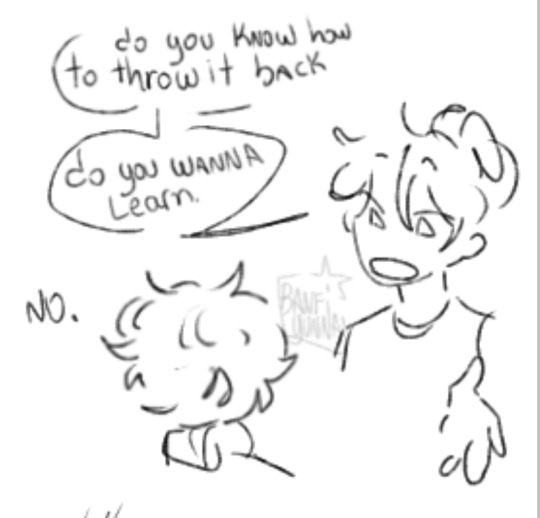
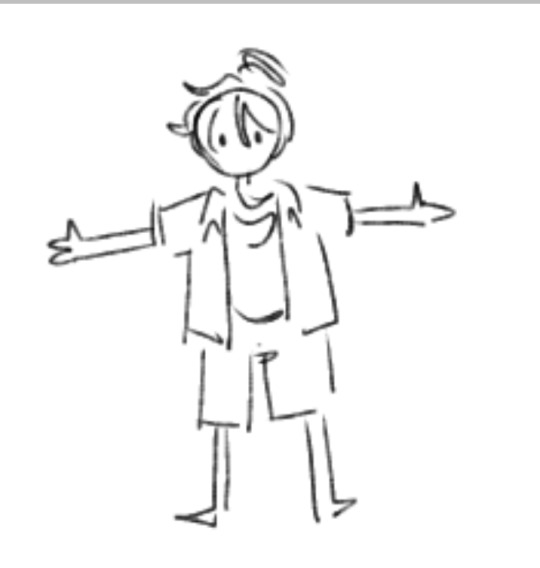

#vanessa my beloved shes just a doomed girlie. slay#shoutout to however decided she had rainbow hair i have no memory whatsoever where it came from but its the design of all time#just know its a popular headcanon and ppl r so right#honestly i remember not being very fond of her when she first came out but she grew on me with the doomed narrative#immortal au#doodles#sunshine draws#oc#oc — perkeo#oc — sean#fnaf vanessa#fnaf vanny#perkeo: im befriending animatronics so i wont have to dwell on the short span of the human existence and worry about relationships#also them after getting adopted by an extrovert hundreds of years younger than them:#sean tag#doubled tagged cuz tumblr bad
196 notes
·
View notes
Text











Fanfic Classics Series ⏳🪐🌌 This batch of fanfiction deals with the multiverse!!! Time travel!!! Imminent thoughts about life and death!! Past lives and dreams of a future together — get ready to witness a love for the ages.
the earth from a distance by spqr
A Beginner’s Guide to the Afterlife by mcsyndrome
Us, infinite (unfortunately) by @thecouchsofa
"An Emerald In The Sky" by @corvuscrowned
In Every Universe by @skeptiquewrites
Our Little Life by @tackytigerfic
Dwelling by aideomai
there will be time, there will be time by @amywaterwings
Harry Potter and the Future He Doesn't Really Want, Thanks. by orphan_account
Everything is Relative to You by @thehoneybeet
The Star Splitter by @oflights
art credits + some cover commentary under the cut :)
I had a lot of fun finding/using artworks with circles, lines, and shapes to symbolize different worlds/universes and/or the passage of time...
Artworks used, in order:
"Several Circles" by Wassily Kandinsky (1926)
"To all appearances, it was a hand of flesh and blood just like my own" by Odilon Redon (1896) — A ghostly hand that fits the plot. The artwork's title goes with the fic so well too...
"(#2) (from series, Quantum)" by Garo Antreasian (1966)
"The story of the sun, moon, and stars (1898)" by Agnes Giberne — inspired by the summary "Somewhere along the way, Draco realizes he's been thinking in lines, when he should have been thinking in circles." The original artwork comes with a caption 'Stars whose distances are well-known'... I really feel that it fits since Draco was named after a constellation... Also, the star-circles have numbers on them, which could be interpreted as H/D through different ages...
Max Brückner’s Collection of Polyhedral Models (1900) — Exploring different parallel universe versions of yourself... the more things change, the more they stay the same.
"Construction (SM lg71)" by László Moholy-Nagy (1924) — some mild spoilers for the fic! inspired by the phrases "...plot a path through the many universes such that he would never die." / "flickering through timelines? Just getting glimpses, really" .
"Fish Magic" by Paul Klee (1925)
"The Terrace at Saint-Germain, Spring" by Alfred Sisley (1875)
"Arrival of the Normandy Train, Gare Saint-Lazare" by Claude Monet (1877)
"Charing Cross Bridge: Fog on the Thames" by Claude Monet (1903) — referenced in the fic. i try to pay attention!
"Boy with Kite" by Candido Portinari (1947) — Harry is a precious little lamb. more elaboration here
i’ve been making penguin classics-style covers for fics i have saved on my kindle, as inspired by zeziliazink and bubu0h’s works!
#taking you guys through my ao3 bookmarks#please read these (n give kudos and a heartfelt comment after)#kiss my covers#fanfic covers#drarry fanfic#hpdm#fanfic book covers#drarry book covers#harry x draco#drarry fic recs#hpdm fics#aideomai#spqr#tackytiger#skeptique#corvuscrowned#honeybeet#oflights#seefin#thecouchsofa#waterwings#mcsyndrome#kiss my recs#Dwelling#The Earth from a Distance#A Beginner's Guide to the Afterlife#There Will Be Time There Will Be Time#Us Infinite (Unfortunately)#public domain art#kiss with a list
347 notes
·
View notes
Text






New life overruns; the dust of dried tears is cleaned out and tossed into the wind; a table is placed where a friend once stood, day after day, waxing poetic to the beetles lining the windowsill; their conversations smother our glittering memories of whiling the days away in pleasant company, heedless of time, freeing ourselves – for just a moment – from the weight of responsibility to the star. Would that I might claim in me his desires wholly absent, but I dare not be so prideful.
(dialogue slightly edited from this WIP Wednesday post to fit images)
#gpose#gposers#ffxiv gpose#ffxiv#ffxiv screenshots#miqo'te#wol oc#ffxiv wol#lillian post#If this sounds like Venat excusing Emet-Selch then I am sorry for failing as a writer and I will do better by the time I reach this scene#the idea was to have Venat essentially go “yeah I get it. I might have the done the same in his position. Really fucked up to think about.”#“understandable motive - still murder on a scale undreamt of though. I love my people and all living things too BUT”#“after thousands of years of depression and dwelling on an ancient I considered a friend forever changing the course of history - Yeah.”#also this is a slightly tweaked version of the original WIP so i could fit it into a photoset
66 notes
·
View notes
Text
I'm sure most are already familiar with the hidden quotes in the cast list, but despite the odds being high that there is one — I just couldn't find any posts that included all of them, so I thought I might as well make one myself.
[For Context: within this page, when you check the descriptions for each character, there is an additional paragraph added at the end where the font is 0 pixels big, and therefore "hidden". You can check is by inspecting HTML, or just… copy-pasting the paragraph.]
———



Teruko Tawaki "It is an equal failing to trust everybody, and to trust no one at all."
Xander Matthews "survivor guilt(n): feelings of guilt for having survived a catastrophe in which others died."
Charles Cuevas "If you forgot it, then it probably wasn’t important to begin with. None of those memories should ever be kept, anyway."



Ace Markey "I don’t know what to do with myself anymore."
Arei Nageishi "Because that’s what friends do."
Rose Lacroix "In the end, the only thing I can do is watch my wretched life go on."



Hu Jing "I want to pay for what I’ve done. But even then, I still want to live."
Eden Tobisa "You can’t go back, no matter how hard you try."
Levi Fontana "I always believed that a person is defined by their actions alone. But maybe that’s just a poor excuse for my heartlessness."



Arturo Giles "You hated them, but even that doesn’t justify what you did."
Min Jeung "I wanted to save you."
David Chiem "I hate you, I hate you, I hate you. I wish you could just die."



Veronika Grebenshchikova "Once something is broken, it can never be pieced together in quite the same way again. The same goes for people."
J Rosales "Please don’t call me your daughter ever again."
Whit Young "We tend to idolize the dead."



Nico Hakobyan "Why should I own up for the mistakes that someone else made?"
MonoTV "Her name is Mai Akasaki."
Mai Akasaki "run script()"
———
#drdt#danganronpa despair time#dav text#(should clarify Mai's has a random name inserted into the paranthesis matching the random quote. Added the link for reference)#(< not that im gonna dwell more into That rabbit hole though I'm sure its been done plenty)
44 notes
·
View notes
Text
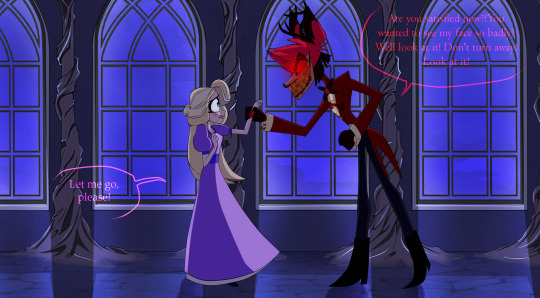
I re-read the fanfic of Love Is Never Ugly (by @fantasyandromancelover ) recently so I made this.
You will find the moment of the Beauty and the Beast re-telling here, where Charlotte sees Alastor directly for the first time, and man it couldn't have been a worse moment...
#charlastor#fanfic fanart#alastor#charlie morningstar#beauty and the beast retold#hazbin hotel au#hazbin hotel#beauty and the beast#horror moment#not as much as the moment that happened about one minute though#he was eating someone#yes that bad#and since charlotte is a ray of sunshine who didn't dwell much on his diet she was very scared the first time she saw#classic beauty and the beast inspired instead of the disney one#also a old french one that was kind of dark
62 notes
·
View notes
Text
actually heartbreaking to me that once Skizz fell off the edge of the platform, Grian knew he was gone. didn’t bother to move, or scream, or check. he couldn’t bring himself to look because he didn’t want to see what was left of his friend :(
#if I can get angsty for a moment here#I think a huge part of Grian’s character is that he’s self-preserving. not just in the game but emotionally as well#if something is going to cause him emotional distress he will simply not acknowledge/dwell on it.#who’s got time for processing?? pssshh not this guy#and that’s why he moves on to new teammates so fast. he’s got games to win people to kill yknow? It’s almost like it never happened#one day I want the trauma to catch up to him. put him in a situation where he’s forced to deal with his thoughts. take that bird boy >:)#my post#life series#trafficblr#wild life#wild life spoilers
78 notes
·
View notes
Text
Wei Wuxian and Narrative Agency – Part One
For Xiantober Day One: Genius… albeit stretching the prompt so it refers to MXTX and MDZS itself, but at the end of the day it’s still about WWX – so no harm done!
(Part Two | Part Three | Full version on AO3)
The narrative is a very active player in MDZS’ story. How it presents information, what it chooses to show and omit, often reflects important facets of its themes and characters – Nie Huaisang, for instance, is so good at hiding behind his mask that not even the narrative can hold him accountable; the present day’s storyline as a murder mystery and the slow reveal of information about the past both prompt the reader to think critically about the truth of events, when the importance of thinking critically is an important theme; and the dangers not thinking critically (and instead basing conclusions on rumours without much evidence) are shown by tricking unquestioning readers into the very same trap the cultivation world falls into, as the information given by the title, summary and in-universe rumours – which contradicts how we see actually Wei Wuxian act – turns out to be false.
But nowhere do I love this trait more than in its treatment of Wei Wuxian – and, more specifically, in its way of emphasising his agency. We’re not just told how much his active choices define his character, and we’re not just shown this in-universe through his personality, worldview and the events he causes. I’d argue that this aspect goes a step further, and shapes the structure of the out-of-universe narrative as well.
There are two main ways this happens: one, in how the aspects of Wei Wuxian’s life that are shown and hidden directly tell us what’s important about his character (which is good writing but isn’t necessarily tied to this shaping of the narrative), which is what we’ll explore today; and two, how what’s shown and hidden reflects what Wei Wuxian himself prefers to dwell on, resulting in the narrative respecting his own thoughts and feelings on matters (which very much is tied to it). We’ll explore this at a later date.
But as for now – let’s explore my favourite aspect of MDZS.
(Here, narrative agency will be considered the ability of a character to meaningfully influence their events and the story they’re in.)
Tragedy, Circumstance, Choice
If we simply look at Wei Wuxian’s backstory in a vacuum, it seems almost typically tragic. His parents died in circumstances beyond his control, he was left alone as a child with nobody to care for him, he was forced to grow up fending for himself on the streets, he was faced with abuse when he finally was taken in… as with all typical woobies, everything simply happened to him, and none of it was good. It’s just another example of the lack of agency being used for sympathy points, right?
…Except there’s one problem with that idea. We don’t actually see any of this.
It would’ve been easy to start the flashbacks during these times. We’re telling the story of Wei Wuxian in (largely) chronological order, and these are likely important experiences for him! But instead of starting in his street days, or evenat the moment Jiang Fengmian took him in*, we start at the lectures in the Cloud Recesses. That’s not even something mentioned in, and therefore something that’s able to disprove, the rumours at the start of the novel. So why is this the case?
Well, there are multiple reasons – the main one being that MDZS is also Lan Wangji’s (and Wangxian’s) story, and having the flashbacks open with their first meeting is very satisfying. But I want to focus on something else.
This period doesn’t have to be shown, because what happens to Wei Wuxian, especially out of his control, isn’t what’s important about his character.
We’re not even at Lotus Pier here, where Wei Wuxian certainly has more agency than he would’ve had as a young child, but where the harm caused by Madame Yu is still completely out of his control. Here, he has agency! Though there are consequences, he is free to act, and what happens to him is a result of those actions and not of circumstance. Yes, he gets punished more than others who also take those same actions (due to classism); yes, it’s not his choice to be picked on by Lan Qiren in class (yet look how he responds, twisting the situation to his advantage and ending up tricking Lan Qiren into letting him leave, which is what he wanted to do. He is not at all helpless here!); yes, these choices have been influenced by his learned mindset from Madame Yu that punishment is arbitrary and will happen anyway, so you may as well do what you want regardless. But there is cause-and-effect here. It’s not circumstantial tragedy.
Therefore, instead of our first impression of past!Wei Wuxian being that of an unfortunate woobie, it’s of someone who has the freedom, ability and will to choose and act (and that’s after these initial tragic events have taken place). This is compounded by the fact that before we see any of his backstory, we get a similar impression of him in the present day.
If the purpose of his tragic past was to earn him sympathy points, to make us pity him due to how much he was influenced by events out of his control, this would’ve been a terrible way of going about it… and it’s this that betrays the true reason for its existence. Because now, the flashbacks instead show us how little these tragedies define who he is! From the very start, Wei Wuxian isn’t someone defined by circumstances out of his control, but rather by who he is as a person and by what choices he makes in the present day (which is both a mindset in-universe, and a nice little out-of-universe detail that lines up! Because out-of-universe, this means he’s not defined by sympathy points from a backstory, but rather by his great character writing… aka, by who he is as a person and what choices he makes). And this refusal to be defined by tragedy is a conscious choice on his part, too – but we’ll explore that more later.
The important thing is that this idea of Wei Wuxian isn’t because of what exists in his past, it’s because of what parts of his past are shown to us (as well as what he chooses to do, with agency, in the present).
Now, if this relationship between what’s displayed and what’s omitted was just a one-time thing, I might’ve considered it a cool detail or a nice way to establish a character, but not something the narrative is actively focusing on. But it’s a pattern that continues throughout the flashbacks. What, arguably, are the two other most important times in Wei Wuxian’s life where he doesn’t have enough agency to meaningfully influence his circumstances? His three months in the Burial Mounds (before escaping – he managed to assume some control of the circumstances but not enough to substantially reduce his suffering in his time there), and his loss and death during the First Siege. And we’re not shown either of them! We skip to when Wei Wuxian has emerged from the Burial Mounds and is torturing the Wens, or we skip to the present day – both times he has agency once more, because, again, what he’s like without it doesn’t matter enough to be shown.
Furthermore, I’d argue this does actually contrast the other tragic events we see in Wei Wuxian’s later life. Things do go horribly wrong, but it’s either due to choices he knows the consequences of (see: rescuing the Wen Remnants in the first place), or instances where he still has some ability to act in the situation and influence it within the limitations. If he’d had no ability to influence circumstances at Qiongqi path, he would have died in the ambush; if he’d been unable to do that at Nightless City, he would’ve died then, too (of course Lan Wangji helped him escape as well). The attention drawn to him losing control of his actions in both instances is very interesting, but intentional or not, it’s still his actions influencing the plot. And that influence happens to be detrimental. The very ability to act and influence, at a base level, is not taken away (though, of course, that doesn’t make these events any less tragic).
So, so far, the narrative seems to be telling us that the ability to act and choose is key to Wei Wuxian’s character. And it’s doing it through omitting his moments without agency in favour of instead showing us his moments with it.
Let’s see if this is echoed in the text itself before we go further – because even with this pattern, nothing would end up mattering if Wei Wuxian’s agency wasn’t actually that important to the story itself. But thankfully it is, and that first impression we get of Wei Wuxian in the Cloud Recesses turns out to very much be accurate! Though there are defining circumstances out of his control that occur, such as the massacre of Lotus Pier, the majority of the important events of his life are due to his own choices. He didn’t happen to be forced to cease traditional cultivation and solely use guidao, didn’t happen to lose his Golden Core in a fight with Wen Zhuliu or due to some force in the Burial Mounds, it was his own choice to give it and his spiritual powers away. He didn’t tragically happen to get targeted by the cultivation world, it was a result of him acting on his morals and protecting the Wen remnants (a choice which he was fully aware of the implications of). He isn’t a protagonist to whom things simply occur, and that activeness and agency is my favourite thing about him.
That’s not to say that the times Wei Wuxian doesn’t have agency, or feels like he doesn’t have any, don’t exist at all, either – but they are rare enough to have attention directly drawn to them in his internal narration:
Or else what could he do? He could do nothing. He was powerless. Lotus Pier had been destroyed, both Jiang FengMian and Madam Yu were gone, and Jiang Cheng had disappeared as well. He was the only one left, alone, with not even a sword in his hands. He didn’t know anything, he couldn’t do anything! For the first time, he discovered how little his power was. In front of something as large as the QishanWen Sect, it was the same as a mantis trying to stop a chariot. - Chapter 59, EXR translation
(And even in this circumstance, note that he still does force himself to act – to carry on searching for Jiang Cheng, to place his faith in Wen Ning – and does accomplish his goal (albeit with the help of others)! So even in dire situations, he isn’t simply passive. This is actually also the case with his time in the Burial Mounds, almost certainly the First Siege, and even his days on the streets as well (Chapter 20: he did actively fight with dogs to get food despite their danger and his growing fear of them, rather than just waiting and hoping to somehow receive some more). He can’t influence or immediately influence his circumstances, but that doesn’t stop him from trying.)
Overall, although they do influence him, Wei Wuxian is very much who he is in spite of his circumstances, not because of them. We’re shown the importance of his agency both in-universe by the major impacts his choices have on himself and the plot, as well as by narrative presentation – important periods where he lacks the ability to meaningfully influence anything are often mentioned but not directly shown, which suggests that such moments and circumstances aren’t as important to understanding Wei Wuxian’s character as moments where he does have this agency are. And I’d argue this works very well. Depending on the version of the story you consume, you may end up having different interpretations as to how much circumstances were at play nearer the end of his life – but nobody comes out of MDZS thinking about Wei Wuxian, the poor bearer of yet another generically tragic backstory.
(Part Two | Part Three | Full version on AO3)
—
*We are shown this moment in more detail in Chapter 23… but even then, it’s through the framing of Wei Wuxian remembering Jiang Yanli’s narration, not through a flashback proper or even him remembering the experience itself!
#there are three parts to this#part two dwelling on how wwx not dwelling on tragedy is a conscious choice#part three about how that choice and wwx’s preferences are ALSO behind what’s shown and what’s not#i originally wanted to post them all at once but life was very busy and they haven’t been finished yet#and i wanted to release SOMETHING on this day (it is after midnight but i haven’t slept yet and in a lot of timezones it’s not yet)#judging by the current length of it it’s probably better to be posting individual parts anyway…#so here we go#a complete version will br put on ao3 when done#also because i’m not sure where to put it in the meta – i’m aware external circumstances did impact this too#eg mxtx not wanting to write power-up/transformation sequences influencing her not to write wwx’s time in the burial mounds#i’m also aware a lot of this could be writing efficiency and not the deeper meanings i’ll (mostly later) assign to it#ultimately there’s not enough evidence either way to say if this was intentional or not#(i don’t doubt mxtx is an amazing writer but *i* feel i’m overanalysing while writing this which i do tend to do)#but even if it wasn’t it’s still a part of the story#and it still remains one of the things i love it the most#so i WILL explore it (taking the approach of death of the author here – i do believe context is important but i just love this throughline-#-so much)#xiantober#xiantober day 1#mdzs meta#my meta#wei wuxian#wwx#mdzs#mo dao zu shi#魔道祖师#grandmaster of demonic cultivation#gdc
121 notes
·
View notes
Text
Final post about Adventure Time/Fionna and Cake for tonight, but I was rewatching episode 5 and I noticed that during the scene where Fionna, Cake and Simon are eating dinner with farm-world Finn and his family - Simon quite clearly doesn’t eat during the scene.
I didn’t really notice on my first viewing as we don’t really see any of them eat except for Fionna and Cake, but it’s still implied that they did. We see everyone around the table has bowls towards the end of Dinner except for Simon.
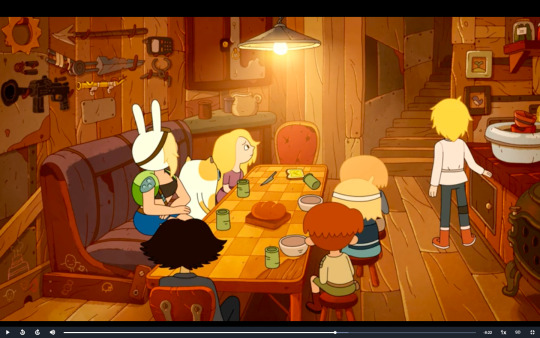
(Note: Cake’s bowl is not present because it’s in her hand. Fionna’s is possibly covered by Simon’s head. Jay, Bonnie and Finn don’t have bowls because Jay moved them to the sink)
This is especially odd considering that he was given a bowl before dinner started.
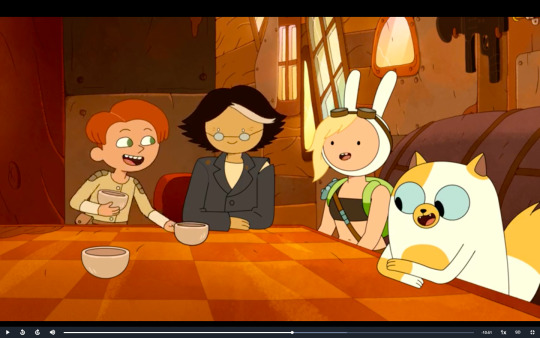
Now this could just be an animation error (it most likely is tbh), but it got me thinking about how Ice King’s weight changes throughout the series as his eating is heavily reliant on his mood.
It then reminded me that throughout the 6 episodes we have so far, Simon has only eaten one meal. That is the cereal he had for breakfast in episode 2.

Besides that, the only other time that he would have consumed something full-filling would be the coffee he makes in the same episode, but he doesn’t even finish that. In every other instance, he is seen a majority of the time drinking alcohol.
The lack of eating would be fine for the most part since it could just be summed up to cartoon logic, but we have also seen many instances of Fionna and Cake consuming full-filling foods and drinks (hot chocolates, sandwiches, soups etc.).
All of this made me realise that Ice King’s eating habits might not just be an Ice King thing, but something that originated from Simon. Idk.
#fionna and cake spoilers#fionna and cake#adventure time#at#simon petrikov#tw: ed#it's not mentioned but i thought to include it since it does dwell on those lines#if this needs to be tagged some more lmk#anyway i am going to bed now
458 notes
·
View notes